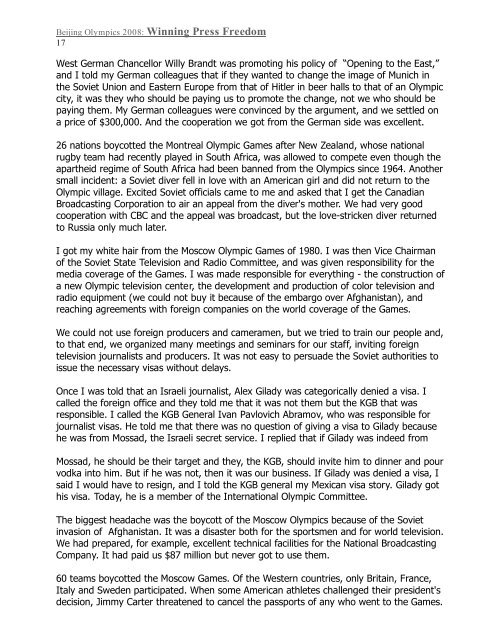Beijing Olympics 2008: Winning Press Freedom - World Press ...
Beijing Olympics 2008: Winning Press Freedom - World Press ...
Beijing Olympics 2008: Winning Press Freedom - World Press ...
You also want an ePaper? Increase the reach of your titles
YUMPU automatically turns print PDFs into web optimized ePapers that Google loves.
<strong>Beijing</strong> <strong>Olympics</strong> <strong>2008</strong>: <strong>Winning</strong> <strong>Press</strong> <strong>Freedom</strong><br />
17<br />
West German Chancellor Willy Brandt was promoting his policy of “Opening to the East,”<br />
and I told my German colleagues that if they wanted to change the image of Munich in<br />
the Soviet Union and Eastern Europe from that of Hitler in beer halls to that of an Olympic<br />
city, it was they who should be paying us to promote the change, not we who should be<br />
paying them. My German colleagues were convinced by the argument, and we settled on<br />
a price of $300,000. And the cooperation we got from the German side was excellent.<br />
26 nations boycotted the Montreal Olympic Games after New Zealand, whose national<br />
rugby team had recently played in South Africa, was allowed to compete even though the<br />
apartheid regime of South Africa had been banned from the <strong>Olympics</strong> since 1964. Another<br />
small incident: a Soviet diver fell in love with an American girl and did not return to the<br />
Olympic village. Excited Soviet officials came to me and asked that I get the Canadian<br />
Broadcasting Corporation to air an appeal from the diver's mother. We had very good<br />
cooperation with CBC and the appeal was broadcast, but the love-stricken diver returned<br />
to Russia only much later.<br />
I got my white hair from the Moscow Olympic Games of 1980. I was then Vice Chairman<br />
of the Soviet State Television and Radio Committee, and was given responsibility for the<br />
media coverage of the Games. I was made responsible for everything - the construction of<br />
a new Olympic television center, the development and production of color television and<br />
radio equipment (we could not buy it because of the embargo over Afghanistan), and<br />
reaching agreements with foreign companies on the world coverage of the Games.<br />
We could not use foreign producers and cameramen, but we tried to train our people and,<br />
to that end, we organized many meetings and seminars for our staff, inviting foreign<br />
television journalists and producers. It was not easy to persuade the Soviet authorities to<br />
issue the necessary visas without delays.<br />
Once I was told that an Israeli journalist, Alex Gilady was categorically denied a visa. I<br />
called the foreign office and they told me that it was not them but the KGB that was<br />
responsible. I called the KGB General Ivan Pavlovich Abramov, who was responsible for<br />
journalist visas. He told me that there was no question of giving a visa to Gilady because<br />
he was from Mossad, the Israeli secret service. I replied that if Gilady was indeed from<br />
Mossad, he should be their target and they, the KGB, should invite him to dinner and pour<br />
vodka into him. But if he was not, then it was our business. If Gilady was denied a visa, I<br />
said I would have to resign, and I told the KGB general my Mexican visa story. Gilady got<br />
his visa. Today, he is a member of the International Olympic Committee.<br />
The biggest headache was the boycott of the Moscow <strong>Olympics</strong> because of the Soviet<br />
invasion of Afghanistan. It was a disaster both for the sportsmen and for world television.<br />
We had prepared, for example, excellent technical facilities for the National Broadcasting<br />
Company. It had paid us $87 million but never got to use them.<br />
60 teams boycotted the Moscow Games. Of the Western countries, only Britain, France,<br />
Italy and Sweden participated. When some American athletes challenged their president's<br />
decision, Jimmy Carter threatened to cancel the passports of any who went to the Games.





